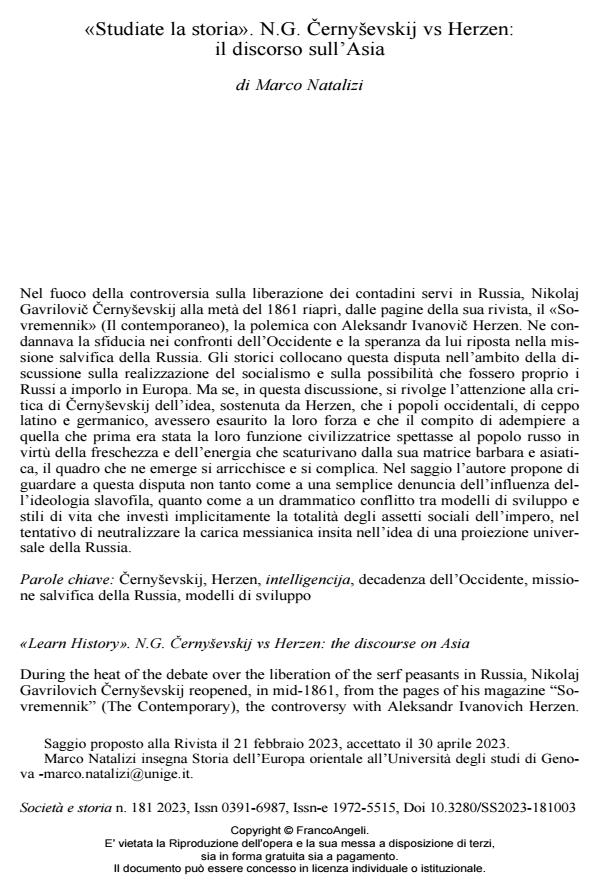«Learn History». N.G. Černysevskij vs Herzen: the discourse on Asia
Journal title SOCIETÀ E STORIA
Author/s Marco Natalizi
Publishing Year 2023 Issue 2023/181
Language Italian Pages 17 P. 458-474 File size 189 KB
DOI 10.3280/SS2023-181003
DOI is like a bar code for intellectual property: to have more infomation
click here
Below, you can see the article first page
If you want to buy this article in PDF format, you can do it, following the instructions to buy download credits

FrancoAngeli is member of Publishers International Linking Association, Inc (PILA), a not-for-profit association which run the CrossRef service enabling links to and from online scholarly content.
During the heat of the debate over the liberation of the serf peasants in Russia, Nikolaj Gavrilovich Černysevskij reopened, in mid-1861, from the pages of his magazine "Sovremennik" (The Contemporary), the controversy with Aleksandr Ivanovich Herzen. Černysevskij condemned Herzen’s distrust of the West and the hope he placed in Rus sia’s saving mission. Historians place this dispute in the context of the discussion re- garding the realization of socialism and the possibility that it was precisely the Rus sians who imposed it in Europe. The whole picture that emerges is enriched and com plicated if the focus shifts to Chernyshevsky’s critique of the idea, supported by Her zen, that, on the one hand, the Western peoples of Latin and Germanic stock had exhausted their strength and, on the other, that the task of fulfilling what was formerly their civilizing function now belonged to the Russian people by virtue of the freshness and energy that sprang from their barbarian and Asian matrix. In the essay, the author proposes to consider this dispute not so much as a simple denunciation of the influen ce of Slavophile ideology, but as a dramatic conflict between models of development and lifestyles which implicitly invested the totality of the social structures of the empi re, in an attempt to neutralize the messianic charge inherent in the idea of a universal projection of Russia.
Keywords: Černysevskij, Herzen, intelligencija, Western decadence, Russia’s saving mission, development models.
Marco Natalizi, «Studiate la storia». N.G. Cernysevskij vs Herzen: il discorso sull’Asia in "SOCIETÀ E STORIA " 181/2023, pp 458-474, DOI: 10.3280/SS2023-181003